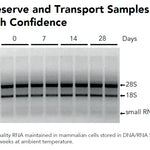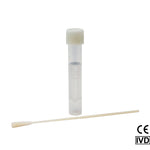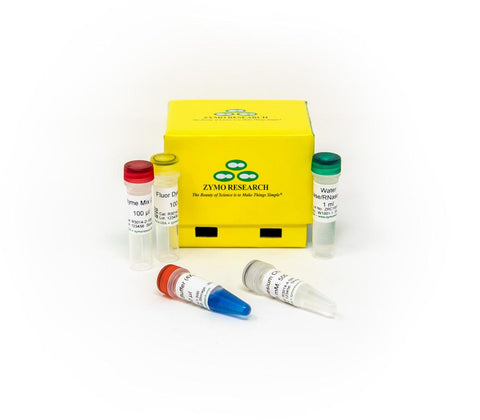Successfully Added to Cart
Customers also bought...
-
 DNA/RNA Shield (50 ml)Cat#: R1100-50DNA/RNA Shield reagent is a DNA and RNA stabilization solution for nucleic acids in any biological sample. This DNA and RNA stabilization solution preserves the...
DNA/RNA Shield (50 ml)Cat#: R1100-50DNA/RNA Shield reagent is a DNA and RNA stabilization solution for nucleic acids in any biological sample. This DNA and RNA stabilization solution preserves the... -
 DNA/RNA Shield SafeCollect Swab Collection Kit (1 ml fill) (1 collection kit)Cat#: R1160The DNA/RNA Shield SafeCollect Swab Collection Kit is a user-friendly collection kit for stabilizing the nucleic acid content of samples collected with a swab. DNA/RNA...
DNA/RNA Shield SafeCollect Swab Collection Kit (1 ml fill) (1 collection kit)Cat#: R1160The DNA/RNA Shield SafeCollect Swab Collection Kit is a user-friendly collection kit for stabilizing the nucleic acid content of samples collected with a swab. DNA/RNA...
Highlights
- Fast: Complete cDNA synthesis and robust amplification in as little as 1.5 hours
- Flexible: Compatible with both SYBR-Green and TaqMan Probe-based assays
- Efficient: Superior performance compared to competitor RT-qPCR kits
Original Manufacturer
Satisfaction 100% guaranteed, read Our Promise
Innovated in California, Made in the USA
Highlights
- Fast: Complete cDNA synthesis and robust amplification in as little as 1.5 hours
- Flexible: Compatible with both SYBR-Green and TaqMan Probe-based assays
- Efficient: Superior performance compared to competitor RT-qPCR kits
Original Manufacturer
Satisfaction 100% guaranteed, read Our Promise
Innovated in California, Made in the USA
| Cat # | Name | Size | Price | Quantity |
|---|
Description
Performance
Technical Specifications
| Amplicon Length | This product performs best with amplicons between 50 bp and 1.5 kb |
|---|---|
| Equipment | thermal cycler/qPCR instrument |
| Ideal Uses | high-throughput applications, multiplex diagnostic assays based on RNA targets, routine quantification of specific targets in multiple samples |
| Processing Time | as little as 1.5 hours |
| Reagents | Complete and ready-to-use Reaction Buffer (4X) and Enzyme Mix (20X). Fluor Dye (20X) included for SYBR-Green based detection. MgCl2 included to supplement the magnesium concentration if needed. |
| Sample Source | 0.1 pg - 5µg RNA input |
| Size | 100 reactions |
| Storage | Store at -20 °C. Minimize exposure to light. |
Resources
Documents
- How to Design Primers
- How to Extract RNA From TRIzol
- Top RNA Isolation Tips
- This product can be used as a building block for molecular tests (e.g., for SARS-CoV-2 detection) and for research applications.
FAQ
The amount of total RNA required may vary depending on the expression level of the target transcripts. In general, we recommend using 0.1 pg - 5 µg of input RNA.
The dye used in the ZymoScript One-Step RT-qPCR Kit has been thoroughly tested in downstream analysis. At the provided concentration, it will not affect fluorescent signal readings during qPCR.
Lower signal can be expected with degraded and impure RNA samples. We recommend using Quick-RNA or Direct-zol Kits (see Related Products) for high quality RNA extraction.
A possible reason for missing or delayed amplification is inefficient primer binding to the template. Make sure to use an annealing temperature (step 4 in the protocol provided) at least 2°C below the lowest melting temperature of the primers to ensure efficient binding to the target sequence.
Yes, the reaction can be assembled at room temperature. The enzymes are only activated at higher temperatures, ensuring maximum specificity.
We do not recommend storing the kit or kit components at room temperature for prolonged periods of time. The kit can be stored at 4°C for up to 1 week.
Samples can be treated with DNase I to eliminate DNA contamination. DNase I is included in the Quick-RNA or Direct-zol Kits recommended for RNA extraction. Alternatively, the DNase I set (see Related Products) can be purchased separately.
No, RNase inhibitors are already included in the enzyme mix to prevent unwanted RNA degradation during reverse transcription.
For single target detection, SYBR Green based assays offer a more affordable solution. For SYBR Green based assays, add 1 µl of Fluor Dye solution (20X) to each 20 µl RT-qPCR reaction. TaqMan probe-based assays are in general more expensive than SYBR Green based assays. However, they present an advantage when multiple targets are analyzed simultaneously and when a superior level of specificity is required. Do not add Fluor Dye solution to the RT-qPCR reaction when performing TaqMan probe-based assays.
In general, any commonly used fluorophore (including HEX, VIC, Cy3, Texas Red, Cal Red 610, Quasar 670, Cy5, Cy5.5, and Quasar 705) is compatible with this kit with the exception of FAM fluorophore, which is unstable in our buffer system. Instead, we recommend using Alexa Fluor™ 488, which has overlapping excitation and emission spectra with FAM, but greater stability.
The Fluor Dye has the same excitation and emission properties as SYBR Green. Activate the SYBR/FAM channel for detection when using the Fluor Dye.
No, a passive reference dye is not included.
This depends on different factors, including RNA integrity and primer efficiencies. Generally, this product performs the best with amplicons with a length between 50 bp and 1.5 Kb.
Product Video
Need help? Contact Us


